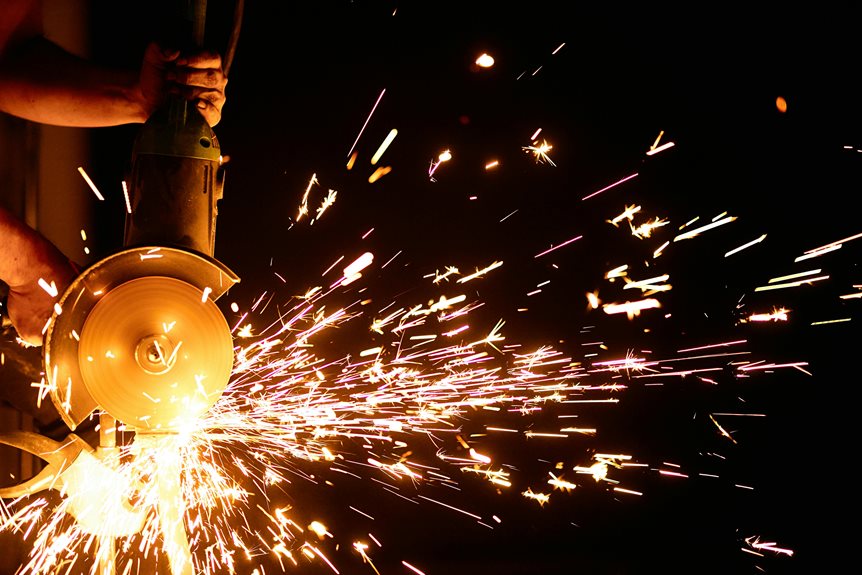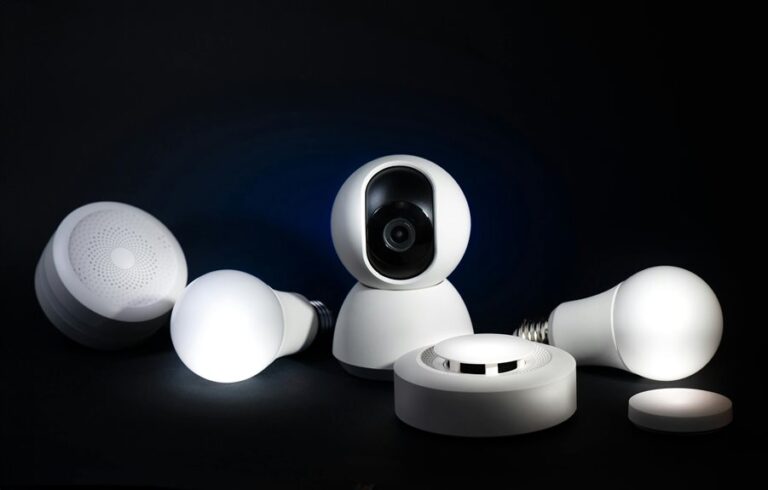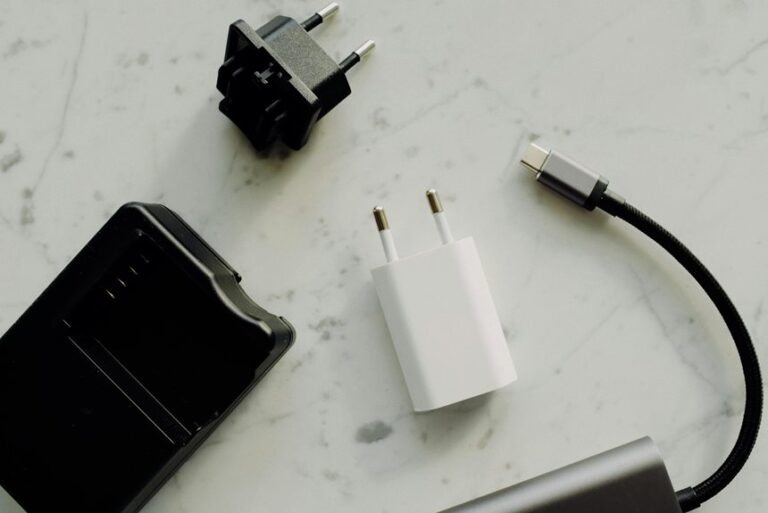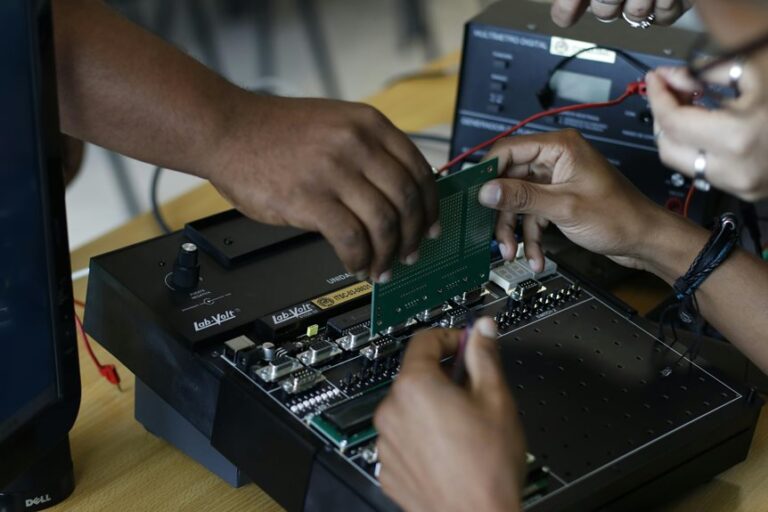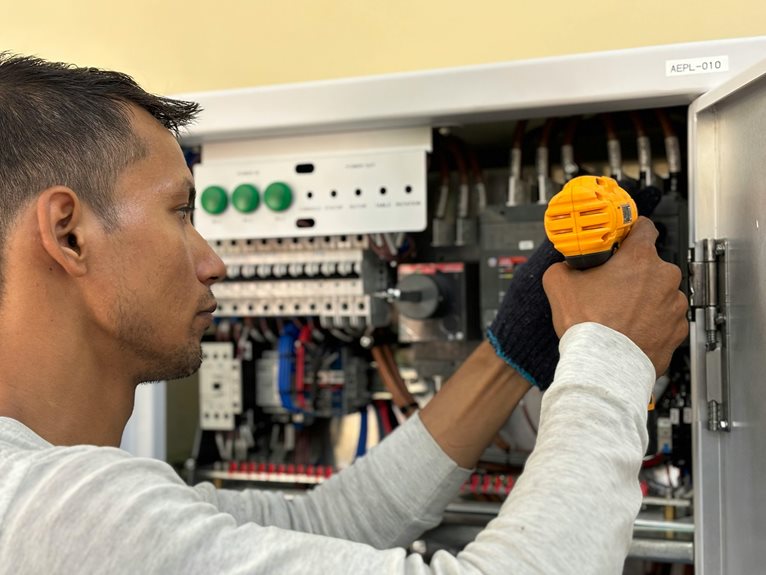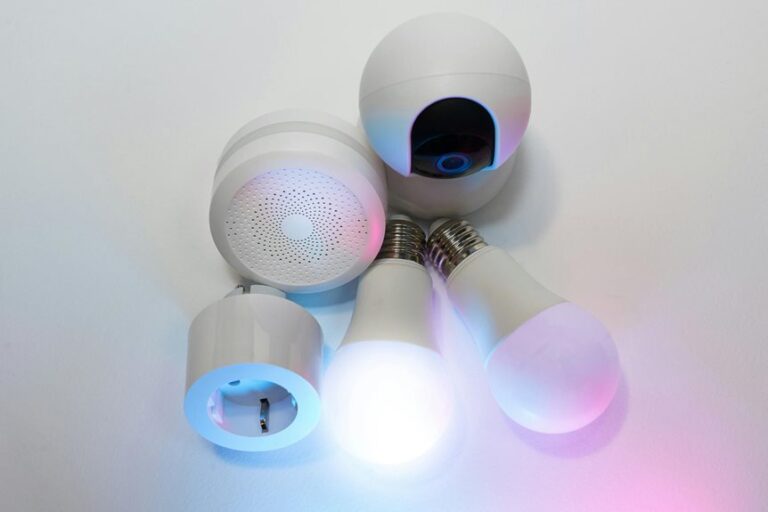Electrical safety's a tightrope walk; one misstep can lead to disaster. You need to understand the common causes of electrical fires, which often stem from faulty wiring or improper use of appliances. Regular inspections are essential to identify potential hazards before they ignite. It's also crucial to know how to respond in emergencies, ensuring you have the right tools on hand. But what if you're already facing an electrical issue? Knowing how to act could mean the difference between safety and tragedy.
Common Causes of Electrical Fires
Electrical fires often ignite from a few common causes that you should be aware of to protect your home and safety. One significant cause is overloaded circuits. When too many devices draw power from a single outlet, it can heat the wires beyond their capacity, leading to ignition.
Always guarantee that you distribute electrical devices evenly across different outlets.
Another culprit is faulty wiring. Damaged insulation or loose connections can create sparks, increasing the risk of fire.
Regularly inspect your wiring for any signs of wear or damage.
Additionally, malfunctioning appliances can also trigger electrical fires. If you notice frayed cords or unusual smells, disconnect these appliances immediately and consult a professional for repairs.
Lastly, improper use of extension cords is a frequent issue. These cords are intended for temporary use, and relying on them for permanent wiring can lead to overheating.
It's essential to hire qualified electricians who can ensure that your home's electrical system is safe and up to code.
Importance of Proper Wiring
Proper wiring is essential for maintaining a safe and efficient electrical system in your home. When you install wiring correctly, you minimize the risk of electrical fires, short circuits, and equipment damage. The right gauge, type of wire, and proper insulation are critical in preventing overheating and excessive current flow.
Using outdated or damaged wiring can lead to severe hazards. For instance, aluminum wiring, common in older homes, is prone to oxidation, which increases resistance and heat production. It's important to replace such wiring with modern copper alternatives that meet current safety standards.
Additionally, ensuring that your wiring is installed according to local codes enhances safety. This includes using circuit breakers and fuses that are appropriately rated for the load they'll handle. Overloading circuits can cause wires to overheat, leading to potential fire risks.
You should also consider the layout of your wiring. Properly spaced outlets reduce the need for extension cords, which can become fire hazards if overloaded. Moreover, hiring top electricians from your area can ensure that the installation meets all safety guidelines and standards.
Regular Inspection Guidelines
Routine inspections of your electrical system play an essential role in fire safety. Regular checks help identify potential hazards before they escalate. Make it a habit to inspect your wiring, outlets, and circuit breakers at least once a year. Additionally, consider hiring reliable electricians who can provide expert evaluations and ensure your system is up to code.
Here's a quick guide to help you with your inspections:
| Component | Inspection Frequency | Signs of Concern |
|---|---|---|
| Wiring | Annually | Fraying, discoloration |
| Outlets | Bi-Annually | Burn marks, loose connections |
| Circuit Breakers | Annually | Frequent tripping, rust |
| Smoke Alarms | Monthly | Non-functioning, expired |
| Ground Fault Circuit Interrupters (GFCIs) | Monthly | Non-resetting, audible alerts |
When you conduct these inspections, look for signs of wear or damage. Pay attention to any unusual smells or sounds. If you spot issues, don't hesitate to consult a licensed electrician for further evaluation. Remember, preventive maintenance is your best defense against electrical fires. By staying proactive, you can guarantee a safer environment for yourself and your loved ones.
Safe Use of Electrical Appliances
After verifying your electrical system is regularly inspected, it's important to focus on the safe use of electrical appliances.
Start by checking each appliance for any visible signs of damage, such as frayed cords or cracked casings. If you find any defects, replace or repair the appliance immediately.
Always plug appliances directly into wall outlets, avoiding the use of extension cords for extended periods. If you must use an extension cord, choose one rated for the appliance's load and confirm it's not overloaded. Avoid running cords under rugs or furniture, as this can cause overheating.
Keep appliances away from water sources to prevent electrocution and short circuits. When using appliances, follow the manufacturer's instructions carefully, especially regarding usage limits and maintenance.
Finally, never leave appliances running unattended. Unplug devices when they're not in use, especially high-wattage items like space heaters and irons.
By implementing these safety measures, you greatly reduce the risk of electrical fires and confirm a safer environment for yourself and others. Regular consultations with expert electricians can also help ensure your home's electrical system is in top condition.
Prioritize safety in every interaction with electrical appliances to safeguard your home.
Emergency Response Tips
In an emergency, knowing how to respond quickly can greatly minimize damage and guarantee safety.
If you notice an electrical fire, immediately activate your fire alarm system and call emergency services. Don't attempt to extinguish the fire unless it's small and manageable. Use a fire extinguisher rated for electrical fires, typically marked with an "E" or "C" symbol. If the fire is too large, evacuate the area immediately.
Ascertain you maintain a safe distance from the flames and avoid using water, as it can conduct electricity and worsen the situation. Close doors behind you to contain the fire and smoke, and always follow your predetermined escape route.
If smoke is present, stay low to the ground to avoid inhaling toxic fumes.
Once you're safe, don't re-enter the building until authorities declare it secure. Document any damage for insurance purposes, and consult a qualified electrician before re-establishing any electrical connections.
Regularly reviewing these emergency response tips can enhance your preparedness and ascertain everyone understands the correct actions to take during an electrical fire.
Conclusion
In the dance of daily life, don't let electrical hazards lead you to disaster. By prioritizing fire safety—ensuring proper wiring, conducting regular inspections, and using appliances wisely—you can safeguard your home and loved ones. When you're prepared for emergencies, you're not just reacting; you're taking charge. Remember, a spark of vigilance today can prevent a raging fire tomorrow. Stay informed, stay proactive, and let safety illuminate your path.

